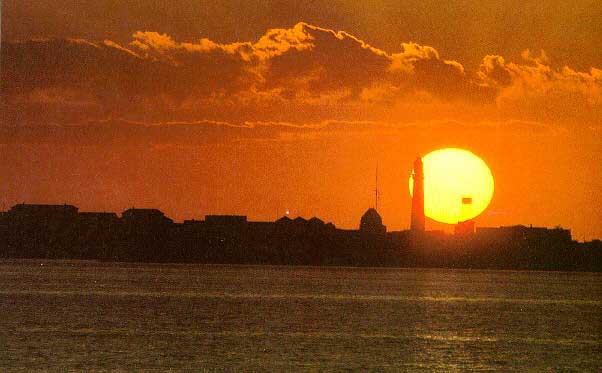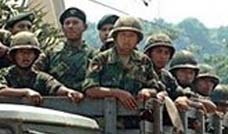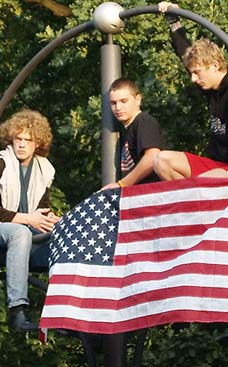
The nation's economic slide was underscored last month when the government's debt was judged to have become the world's riskiest, based on the price of protecting it through instruments called credit-default swaps. Pakistan's foreign exchange reserves fell to $9.13 billion last month, the lowest since 2002. "Pakistan is seriously struggling,'' said David Chatterjee, who helps manage $112 billion of investments at Pictet Asset Management in London. "Politics will remain an overhang even after the presidential election -- but more important is economics.'' Zardari's victory makes him the most powerful civilian ruler in a decade and gives his party unprecedented control over the legislative and executive branches of government. In the 1990s, both Sharif and Zardari's assassinated wife, former prime minister Benazir Bhutto, ruled alongside cooperative presidents. They were forced from office amid corruption scandals and confrontations with the politically powerful military. Under civilian governments, which have ruled Pakistan for less than half of its 61 years since independence from Britain, even "strong configurations of power have failed to provide stability and good governance,'' said Talat Masood, an independent political analyst and former army general in Islamabad. Even when the military has retreated from direct rule, it has overshadowed civilian administrations, including on economic policies, he said. Journalist James Rupert, head of Newsday's international bureau in Islamabad, Pakistan began his career abroad as a Peace Corps volunteer, teaching mechanics and welding in Morocco.
James Rupert writes: New Pakistan President Will Face `Struggling' Economy
New Pakistan President Will Face `Struggling' Economy (Update2)
By James Rupert
Enlarge Image/Details
Sept. 8 (Bloomberg) -- Pakistan's Asif Ali Zardari is set to take over as president of a country with the world's riskiest debt, the weakest currency in its history and a stock market so depressed that the exchange ordered a freeze on price declines.
"I mean business and will pull Pakistan out of its present state of affairs,'' Zardari told the News newspaper after being elected Sept. 6 by Parliament where his Pakistan Peoples Party has a majority. While Zardari has pledged to continue a decade of economic liberalization, he has given no details.
Zardari's swearing-in tomorrow may end 18 months of government paralysis caused by his power struggles with former president Pervez Musharraf and ex-prime minister Nawaz Sharif, whose Pakistan Muslim League is the second-largest party. International investors have fled a stock exchange that has nearly halved in value this year, the worst performance in Asia after China, as subsidies for food and fuel and record military spending widened the budget deficit to a 10-year high.
"The fiscal issue is the weakest link in the policy mix'' and "the depletion of foreign exchange reserves is fairly worrying,'' said Sakib Sherani, Islamabad-based country economist for the Royal Bank of Scotland. Zardari, 52, "won't have the luxury of dealing with them one by one; he will have to deal with a lot of challenges simultaneously,'' he said.
Interest Rates
Sharif met Zardari for the first time since their coalition split Aug. 25 and declined his request to rejoin the government, said Sharif's spokesman, Ahsan Iqbal. Still, the leaders agreed to "work together in the spirit of democracy and as a show of mutual respect,'' Iqbal said. A thaw in their relations may let the government shift its focus to Pakistan's crises.
While the economy grew 7 percent annually over the previous five years, it slowed this year as the central bank raised interest rates to the highest in Asia to tackle inflation at a three-decade high. The rupee is down 20 percent, snapping four years of gains, and is on course for it worst year since at least 1998, when tit-for-tat nuclear tests with India last pushed the government to the brink of default.
The Karachi Stock Exchange imposed emergency trading limits on Aug. 28, preventing stocks from falling below their closing prices on Aug. 27, to halt a drop in shares that has dragged the index down by 32 percent this year. Those measures are scheduled to be reviewed tomorrow.
World's Riskiest
The nation's economic slide was underscored last month when the government's debt was judged to have become the world's riskiest, based on the price of protecting it through instruments called credit-default swaps. Pakistan's foreign exchange reserves fell to $9.13 billion last month, the lowest since 2002.
"Pakistan is seriously struggling,'' said David Chatterjee, who helps manage $112 billion of investments at Pictet Asset Management in London. "Politics will remain an overhang even after the presidential election -- but more important is economics.''
Zardari's victory makes him the most powerful civilian ruler in a decade and gives his party unprecedented control over the legislative and executive branches of government. In the 1990s, both Sharif and Zardari's assassinated wife, former prime minister Benazir Bhutto, ruled alongside cooperative presidents. They were forced from office amid corruption scandals and confrontations with the politically powerful military.
Under civilian governments, which have ruled Pakistan for less than half of its 61 years since independence from Britain, even "strong configurations of power have failed to provide stability and good governance,'' said Talat Masood, an independent political analyst and former army general in Islamabad. Even when the military has retreated from direct rule, it has overshadowed civilian administrations, including on economic policies, he said.
Finance Ministers
The nationwide elections in February, won by Zardari's PPP and Sharif's PML faction, and subsequent fracturing of the coalition government meant Pakistan has had three finance ministers this year, hampering the government's efforts to forge economic policy.
In the country's main seaport and industrial center, Karachi, the decaying electrical system is shut down for most of the 15 million people for six to eight hours a day. The United Nations' World Food Programme said in April that as many as half of the 168 million Pakistanis were struggling to afford food.
Zardari "should be ready to cut the government budget as a way to halt "quite excessive'' borrowing that is helping drive inflation, said Sherani. While the army has retreated from its eight years of direct rule under Musharraf, it remains powerful and will resist reductions in its budget which forms more than 15 percent of government spending, he said.
Army Failed
The army has failed this year to block the spread of the insurgency by Taliban guerrillas in northwestern Pakistan, near the Afghan border. The death toll in their latest suicide bombing doubled to 33 yesterday as officials reported finding more bodies in the debris of shops outside the northwestern provincial capital, Peshawar.
"The big challenge is the economy,'' Sartaj Aziz, who served as foreign and finance ministers in Sharif's government, said in a Bloomberg Television interview today. "The other challenge is to deal with extremism in border areas with Afghanistan.''
The stuttering economy has made Pakistan more reliant on overseas assistance to pay for military spending and cover the soaring costs of importing crude oil.
U.S. Democratic presidential candidate Barack Obamatold Fox News on Sept. 5 he would hold Pakistan and its army accountable for U.S. aid to fight the Taliban and al-Qaeda. Pakistan has misused some of the money for military preparations against its traditional rival, India, he said.
Republican nominee John McCain also has voiced doubts about Pakistan's counter-terrorism strategy under Musharraf. Neither candidate has advocated cutting U.S. aid, which at $10 billion over seven years has been a prop for Pakistan's economy.
To contact the reporter on this story: James Rupert in Islamabad at jrupert3@bloomberg.net.
Last Updated: September 8, 2008 05:52 EDT












